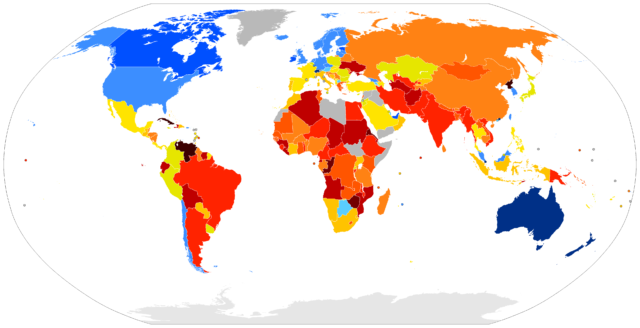Can Bitcoin be even better than the Economic Freedom Index in measuring the degree of economic freedom in the world’s nations?
Fear, Uncertainty, Doubt
Read the mainstream press about Bitcoin, and you’ll see headlines such as China Bans Bitcoin, South Korea Too!, Russia Plans to Ban Bitcoin, India Says Bitcoin is Not Legal Tender etc. Meanwhile, a dubious group of regulators appears to be waiting on the sidelines ready to crack down with swat teams and helicopters on standby.
Scared yet?

Sure, this type of information can be a powerful in not only keeping new potential cryptocurrency buyers at bay but also sowing doubt in the minds of existing holders.
Whether the press putting such a spin is deliberate disinformation or an attempt to simply get more clicks is largely irrelevant as influential individuals on social media and even government officials have been found pushing their own ‘fake news’ to profit from the resulting price action.
But don’t press Sell just yet. One must first consider not only the repercussions of a potential Bitcoin ban, but also whether such a law can even be enforced.
#Budget2018
Wrong interpretation: Bitcoin is illegal.
Correct interpretation: Bitcoin cannot be used as legal tender. Bitcoin cannot be used for illegitimate activities.— zebpay (@zebpay) February 1, 2018
Where is Bitcoin Officially Banned?
If a country was indeed concerned about “illegal activities” and wanted to outlaw using Bitcoin on its territory, it would have already done so…and some have.
Bitcoin has existed for nine years, during which only about nine countries have made using cryptocurrencies illegal. Bolivia, Ecuador, Algeria, Afghanistan, Kyrgyzstan, Macedonia, Morocco, Bangladesh, and Vanuatu have officially made the use of cryptocurrencies illegal within their borders.
Granted, these places aren’t exactly associated with economic freedom or a bustling fintech scene. However, Bitcoin is not exactly thriving there as well. Ecuador, for example, has simply got rid of the competition to protect their own national digital money system.
“Rolled out to great fanfare by the government in 2013, the digital cash system, operated by cell phone, was a resounding failure with the public, attracting less than 10% of the predicted users,” a local news portal reported. The country’s Central Bank president Verónica Artola believes having banks manage the system will make it more popular.

Meanwhile, citizens in Bitcoin-unfriendly countries like Morocco are nevertheless finding the means, such as peer-to-peer trading, to bypass any government restrictions. Think BitTorrent but for money. Seemingly, people will naturally seek global, open-access money with a hard cap that they have full control over rather than a limitless, state-sanctioned, fiat token.
The Bitcoin Freedom Index
What’s more, Bitcoin is very much aligned with the method used to determine the Economic Freedom Index. According to a report from the Niskanen Center, the index is measured based on:
…personal choice rather than collective choice, voluntary exchange coordinated by markets rather than allocation via the political process, freedom to enter and compete in markets, protection of persons and their property from aggression by others.
If only there was money that is voluntary to use, apolitical, open-access, and lets you have full control of your funds. Sound familiar?
Bitcoin users can safely check all the above boxes, while fiat holders have to buy a plane ticket to Singapore or Hong Kong.

Out of 157 countries, the usual Bitcoin ban suspects are ranked as follows: Russia (99), China (111), India (114), and South Korea (40). At the same time, the most crypto-friendly places, Hong Kong, Switzerland, and Japan come in at number 1, 4 and 26, respectively.
Therefore, the Economic Freedom of countries can be quickly assessed by simply looking at where Bitcoin is being either embraced (top), ignored (middle) or suppressed (bottom).
Based on the Bitcoin Freedom Index, places such as Hong Kong, Switzerland, Denmark, the UK, and the Netherlands would be at the top of the list while Ecuador, Afghanistan, and Bolivia would be somewhere towards the bottom.
Can the Bitcoin Freedom Index be a good alternative indicator of economic freedom across the globe? Share your thoughts below!
Images courtesy of Shutterstock, Wikipedia








